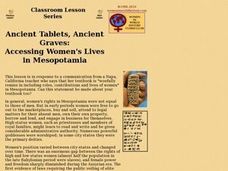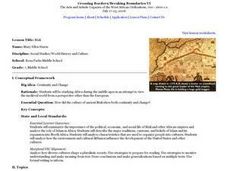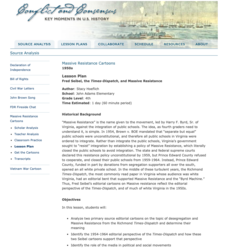Curated OER
Education, Design & Empowerment: Part One
Learners consider the connection between poverty and education. In this language arts and social studies lesson plan, students research primary and secondary sources in order to explore the relationship between education and poverty.
Curated OER
Ancient Tablets, Ancient Graves: Accessing Women's Lives in Mesopotamia
High schoolers explore the role of women in ancient Mesopotamia. Several excerpts from the Mesopotamian cuneiform tablets and artifacts are analyzed to determine the treatment, rights, and powers of women in this era.
Curated OER
Women in the WWII Workplace: Propaganda vs. Reality
In this propaganda worksheet, students analyze posters of Rosie the Riveter and respond to 4 short answer questions about the poster and World War II realities.
Curated OER
Mali
Seventh graders begin the lesson by reading primary sources about the country of Mali. Using maps drawn in the past, they discuss what they can gather about the country from the map and how it has changed over time. They use a graphic...
Curated OER
Child Labor Laws in the United States and the State of Nebraska
Students examine child labor laws. In this social justice lesson plan, students compare and contrast child labor laws of the United States and the state of Nebraska. Students research primary sources and complete the included analysis...
Curated OER
Olaudah Equiano
Eighth graders describe in detail a time in their life when they were the most afraid, causes of the fear and how they overcame it. This experience is compared/contrasted to the actual circumstances behind slave auction blocks. They read...
Curated OER
Worksheet for Analysis of a Postcard
In this primary source analysis worksheet, students respond to 11 short answer questions that require them to analyze the pictured postcard.
Curated OER
Document Analysis Form: Maryland General Assembly
For this primary source analysis worksheet, students complete a graphic organizer based on Maryland government. The primary source documents are not included.
Curated OER
Wanted, a Substitute
For this primary source analysis worksheet, students analyze an American Civil War song. Students respond to 5 short answer questions about the song and its lyrics.
Curated OER
Document Analysis of the Virginia Declaration
In this primary source research worksheet, students examine a copy of the Virginia Declaration (not included) and respond to 6 short answer questions regarding its content.
Curated OER
Worksheet for Analysis of a Written Document
In this primary source analysis worksheet, students respond to 16 short answer questions that require them to analyze the provided historical document.
Curated OER
Document Based Essay Question: World War II
In this primary source analysis worksheet, students examine 4 documents from World War II and then respond to the essay questions that accompany each of them.
Curated OER
The First Vote
In this primary source analysis worksheet, students analyze the political cartoon that features African-Americans waiting to vote. Students respond to 1 short answer question about the cartoon.
Curated OER
Runaway Slave Advertisement from Antebellum Virginia
In this primary source analysis worksheet, students analyze the runaway slave advertisement. Students respond to 5 short answer questions about the advertisement.
Curated OER
Boston Abolitionists Warn of Slave Catchers
In this primary source analysis worksheet, students analyze the advertisement that features a call for African-Americans to beware of slave catchers. Students respond to 6 short answer questions about the advertisement.
Curated OER
FDR's Tree Army: The Civilian Conservation Corps
In this primary source analysis activity, students analyze the a short documentary video clip about the CCC. Students respond to 3 short answer questions about the documentary.
Curated OER
Americans All, Let's Fight for Victory: Americanos Todos, Luchamos por la Victoria
In this primary source analysis worksheet, students analyze a World War II propaganda poster. Students then respond to 2 short answer questions about the poster.
Smithsonian Institution
Mary Henry: Journal/Diary Writing
A great way to connect social studies with language arts, a resource on Mary Henry's historical diary reinforces the concepts of primary and secondary sources. It comes with an easy-to-understand lesson plan, as well as the reference...
Roy Rosenzweig Center for History and New Media
Fred Seibel, the Times-Dispatch, and Massive Resistance
A lesson plan challenges scholars to analyze editorial cartoons created by Fred Seibel, illustrator for the Times-Dispatch, during the Massive Resistance. A class discussion looking at today's editorial pages and Jim Crow Laws leads the...
DocsTeach
Political Cartoon Analysis: No Taxation Without Representation
Delve into the world of political cartoons in a lesson on the American Revolution. Scholars practice analyzing an original political cartoon, answer questions, and participate in group discussion. Young academics gain an understanding of...
Museum of the American Revolution
Historical Analysis: Objects Tell Stories
Dig this! Young archeologists discover what objects teach us about the past. The activity uses an image of a Revolutionary War artifact to help historians practice analyzing the past. Scholars study the object and complete a worksheet to...
Mr. Roughton
Cold Case Rome
Pupils are transformed into detectives in the case to solve the motive behind the assassination of Julius Caesar. This resource includes eight engaging "exhibits" of unique primary and secondary sources for students to analyze during...
Curated OER
Debate: How Should African Americans Achieve Equality?
Each group is assigned a character to play in a mock debate. They read the provided materials, build an argument, and then debate their points of view as their perspective character. The debate focuses on ensuring equality for...
Franklin D. Roosevelt Presidential Library & Museum
Pearl Harbor Activity #4: Who is the Audience?
Young historians use the prompts on a worksheet to analyze President Roosevelt's "Day of Infamy" speech. They identify the intended audience for the speech, the devices FDR used to persuade his audience, the responses promoted, and the...

























